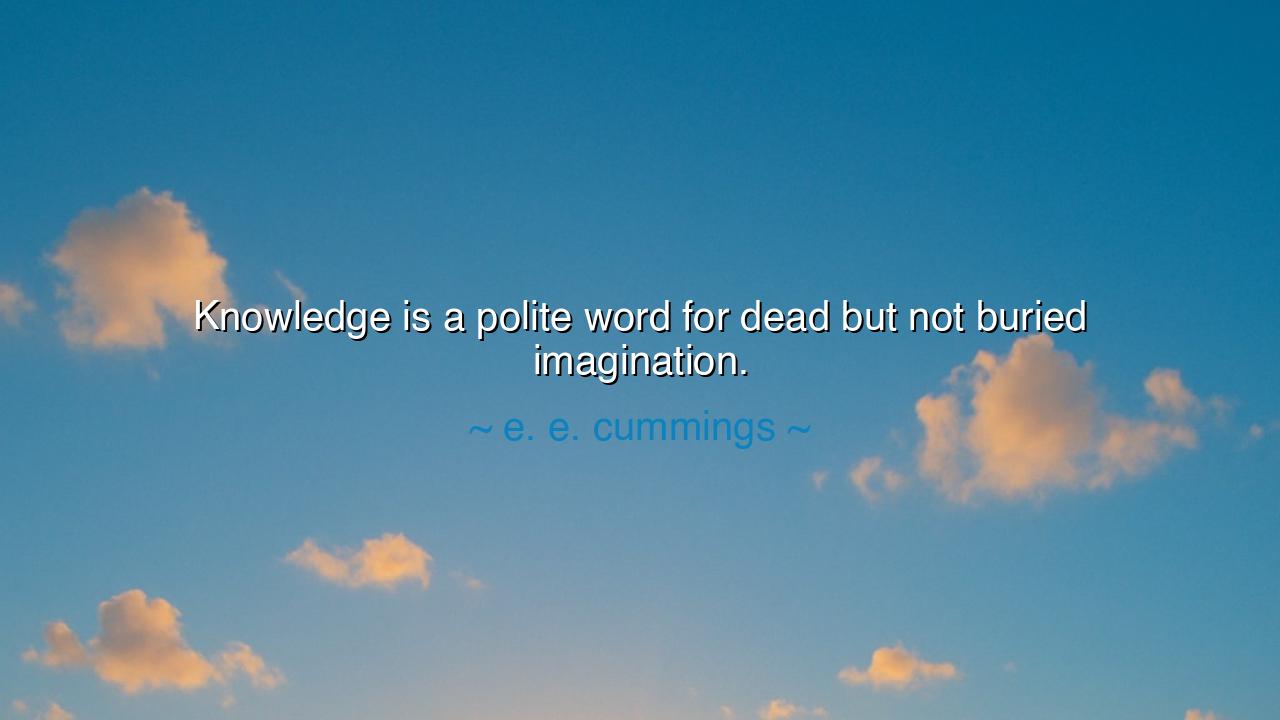
Knowledge is a polite word for dead but not buried imagination.






“Knowledge is a polite word for dead but not buried imagination.” Thus spoke e. e. cummings, the poet who defied the boundaries of form and thought, whose words rose like wildflowers from the cracks of convention. In this statement, he offers not cynicism, but a revelation — that knowledge, though noble in its purpose, often becomes a tomb for the living spirit of imagination. What once was vibrant and creative can grow still beneath the weight of certainty and order. To Cummings, the tragedy is not that imagination dies, but that it is embalmed — preserved by polite society as something once vital but now inert, honored in speech but denied in action.
The origin of this quote lies in Cummings’ lifelong rebellion against intellectual conformity. Living in the early 20th century, he saw a world that worshiped reason and progress but starved the soul. Science flourished, machines rose, and systems of learning grew vast — yet in all this, something luminous was lost. Cummings, who saw poetry as the purest form of imagination, believed that when knowledge is pursued without wonder, it turns sterile. It ceases to be a flame that illuminates and becomes a fossil that decorates the halls of academia. In his eyes, knowledge was not evil, but asleep — “dead but not buried,” waiting to be revived by the breath of creativity.
To understand him is to see the eternal struggle between knowing and imagining. Knowledge gathers, defines, categorizes; it builds walls to make sense of the world. Imagination tears down those walls to discover what lies beyond. One seeks control; the other seeks freedom. And yet, without imagination, knowledge grows stale. It becomes tradition without meaning, wisdom without wonder. Cummings warns that when society glorifies knowledge alone — when we value memorization over creation, logic over vision — we risk turning our most divine faculty into a relic. The mind becomes a library with its windows shut, filled with books that no longer speak.
Consider the story of Galileo Galilei, that daring soul who looked upon the heavens and refused to see them as others did. In his time, knowledge declared the earth fixed and unmoving. It had built a fortress around its certainty. But Galileo’s imagination dared to see another truth — a truth that moved, revolved, and burned with new light. For this, he was condemned by those who guarded the “dead but not buried” wisdom of the old world. Yet, through his imagination, knowledge itself was reborn. His story reminds us that progress does not come from protecting what we know, but from awakening what we have forgotten to dream.
Cummings’ warning, then, is not against learning, but against the death of wonder within it. Knowledge, when humble and curious, is a child of imagination; but when proud and rigid, it becomes its tomb. The wise man does not hoard facts — he breathes life into them. He turns them over like stones, searching for what still lives beneath. In this way, knowledge must remain porous, alive, unfinished — for once we claim to “know” completely, the imagination that gave birth to that knowing begins to fade.
The ancients understood this balance well. Plato taught that knowledge was the recollection of eternal forms — visions glimpsed by the soul before birth. Da Vinci, centuries later, blended science and art so seamlessly that his knowledge never strangled his imagination; it fueled it. He dissected the body not to diminish its beauty, but to deepen his wonder at its design. It is this sacred interplay that Cummings calls us to remember: that knowledge must serve imagination, not silence it. For when knowledge becomes polite — tidy, proud, unquestioning — it ceases to live.
So take this as your teaching, O seeker of truth: Do not let your imagination be buried beneath what you think you know. Let your learning remain fluid, curious, and alive. When you study, ask “why”; when you understand, ask “what more.” Guard against the comfort of certainty, for it is the quiet death of discovery. Cultivate the mind not as a vault but as a garden — where imagination is the sunlight and knowledge the soil. One without the other cannot flourish.
Thus, remember the wisdom of e. e. cummings: Knowledge without imagination is a corpse dressed in fine clothes. Do not worship what is dead; resurrect it. Think boldly. Dream within your learning. Let your imagination breathe life back into what the world calls “fact.” For it is not enough to know the truth — one must also imagine it, love it, and live it, lest it become a relic of what the soul once dared to believe.






AAdministratorAdministrator
Welcome, honored guests. Please leave a comment, we will respond soon